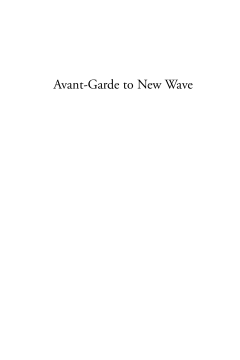
Additional Information
Book Details
Abstract
The cultural liberalization of communist Czechoslovakia in the 1960s produced many artistic accomplishments, not least the celebrated films of the Czech New Wave. This movement saw filmmakers use their new freedom to engage with traditions of the avant-garde, especially Surrealism. This book explores the avant-garde's influence over the New Wave and considers the political implications of that influence. The close analysis of selected films, ranging from the Oscar-winning Closely Observed Trains to the aesthetically challenging Daisies, is contextualized by an account of the Czech avant-garde and a discussion of the films' immediate cultural and political background.
"Jonathan L. Owen’s book will be very valuable for scholars and students of Czech and Slovak cinema and of the Czechoslovak avant-garde generally, as well as for those interested in applying poststructuralist and psychoanalytic theory to film...Each individual film analysis is rich, detailed, well-researched, and original, as Owen smoothly adapts the insights of previous scholars in formulating his own…an undeniably masterful and highly significant study." · Slavic Review
“…a fine study of the Czechoslovak New Wave. It is impressively researched, well read in Czech and Slovak sources, and the contextualization of the New Wave is superb. It is original, and it offers a welcome new approach to the subject.” · Slavonic & East European Review
“Owen provides a useful overview of Czechoslovak avant-garde art from the 1920s to the 1980s and in-depth analysis of a number of movies, some of them not well known in the West. The book will be rewarding reading for those interested in Slavic culture, European avant-gardism, and film studies.” · Choice
"[T]he book's considerable lasting value lies in the quality and depth of the contextual material, accompanied by a lengthy bibliography. Owen's potted history of Czech Surrealism ... is a particularly valuable primer, as is his exploration of the peculiar historical, cultural and political conditions that allowed a surprisingly coherent film movement to spring into existence." · Sight & Sound
"This book can fill a significant lacuna in the scarce international research on and publications about the [Czechoslovak] New Wave … it presents a vital contribution to the study of the period." · Petra Hanáková, Charles University
"I think this is an excellent text. It deals with a very under-researched subject in an original yet comprehensive manner. It is well-written and well-structured." · Elisabetta Girelli, University of St Andrews
Jonathan L. Owen is a Teaching Fellow at the University of St. Andrews. He completed his Ph.D. on Czech cinema at the University of Manchester. His research interests include the European cinema of the 1960s and 1970s and the Czech twentieth-century avant-garde.
Table of Contents
| Section Title | Page | Action | Price |
|---|---|---|---|
| Avant-Garde to New Wave | i | ||
| Contents | v | ||
| List of Illustrations | vii | ||
| Acknowledgements | ix | ||
| Introduction. Surrealism In and Out of the Czechoslovak New Wave | 1 | ||
| Chapter 1. Inspirations, Opportunities: Cultural and Historical Contexts | 25 | ||
| Chapter 2. Pavel Juráček’s Josef Kilián (1963) and A Case for the Young Hangman (1969): From the Surreal Objectto the Absurd Signifier | 46 | ||
| Chapter 3. Jiří Menzel’s Closely Observed Trains(1966): Hrabal and the Heterogeneous | 72 | ||
| Chapter 4. Spoiled Aesthetics: Realism and Anti-Humanism in Věra Chytilová’s Daisies (1966) | 99 | ||
| Chapter 5. Flights From History: Otherness, Politics and Folk Avant-Gardism inJuraj Jakubisko’s The Deserter and the Nomads (1968) and Birds, Orphans and Fools (1969) | 129 | ||
| Chapter 6. Back to Utopia: Returns of the Repressed in Jaromil Jireš’s Valerie and Her Week of Wonders (1970) | 157 | ||
| Chapter 7. Jan Švankmajer: Contemporary Czech Surrealism and the Renewal of Language | 188 | ||
| Conclusion | 218 | ||
| Bibliography | 224 | ||
| Index | 239 |
